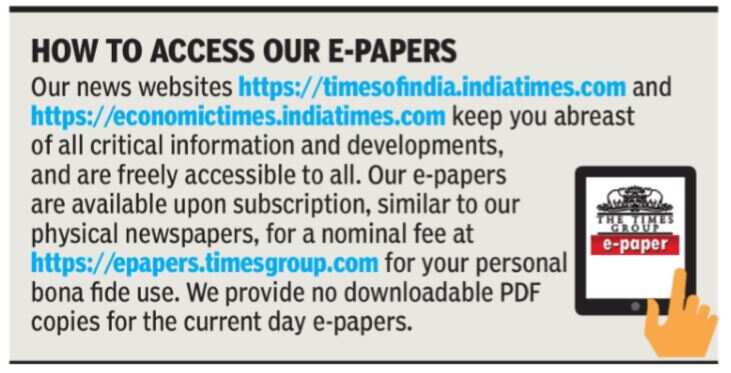Top Searches
- News
- India News
- Sharing newspaper PDFs on social media illegal, say lawyers
Sharing newspaper PDFs on social media illegal, say lawyers

Representative photo: AFP
NEW DELHI: Is your daily newspaper coming to you as a WhatsApp forward in one of your many groups? It’s time to stop downloading it because not only is it unethical, it’s also illegal.
Newspapers are the copyright owners of e-papers and all of its content, and any attempt to copy and circulate the e-papers on social media or apps is a violation of the Copyright Act, say lawyers. These copies are often in PDF format and are wrongly shown as an official offering from the newspaper. According to industry experts, these may contain fake news, may be doctored and give rise to a multitude of legal issues.
Senior lawyer Chander Lall said this was a clear case of violation of Copyright Act. “In my opinion sending mass WhatsApp forwards, or uploading third party content on your website to get clicks is not personal or private use. The act gives the newspaper the exclusive right to reproduce and store the work and every other user who is downloading the newspaper or enabling it is in infringement of the law,” he said.

The piracy of e-papers came in for criticism from the Indian Newspaper Society (INS), the apex body for print publications, which raised concerns that this will hit subscription revenue besides exacerbating the problem of fake news.
Several publishers have also criticised the practice. M V Shreyams Kumar, joint managing director Mathrubhumi, said downloading and distributing PDFs by a third party was a serious matter. “Content is created by organisations with a lot of investment in terms of manpower resource and technology. There is a lot of hard work put in especially during the pandemic. Instead people are able to access e-paper without subscribing to it. It raises the danger of fake news because we do not know how the content has been altered.”
Shivendra Gupta, Business Standard VP, said, “This dissemination in the form of PDFs hurts the industry. Unfortunately, at present there is no technology to stop this. But there needs to be a social contract between the reader and publisher that people should pay for the content that has been produced at great cost.”
Senior Supreme Court lawyer Pavan Duggal said that there are several legal and policy issues involved. “If a digital edition is being circulated without the permission of the owner it is a violation of the Copyright act as well as the Information Technology act section 43 which clearly says that if any attempt is made to destroy, delete or alter any information residing in a computer resource, or diminish its value or utility, it is illegal. The person will be liable to pay damages by way of compensation to the person so affected. I can understand it is being done in public interest but the law does not grant exemption on that basis.”
Recently, the Delhi high court has held in the case filed against messaging app Telegram by Jagran Prakashan that copying e-papers causes irreparable loss, and ordered that unauthorised dissemination be stopped.
Newspapers are the copyright owners of e-papers and all of its content, and any attempt to copy and circulate the e-papers on social media or apps is a violation of the Copyright Act, say lawyers. These copies are often in PDF format and are wrongly shown as an official offering from the newspaper. According to industry experts, these may contain fake news, may be doctored and give rise to a multitude of legal issues.
Senior lawyer Chander Lall said this was a clear case of violation of Copyright Act. “In my opinion sending mass WhatsApp forwards, or uploading third party content on your website to get clicks is not personal or private use. The act gives the newspaper the exclusive right to reproduce and store the work and every other user who is downloading the newspaper or enabling it is in infringement of the law,” he said.

The piracy of e-papers came in for criticism from the Indian Newspaper Society (INS), the apex body for print publications, which raised concerns that this will hit subscription revenue besides exacerbating the problem of fake news.
Several publishers have also criticised the practice. M V Shreyams Kumar, joint managing director Mathrubhumi, said downloading and distributing PDFs by a third party was a serious matter. “Content is created by organisations with a lot of investment in terms of manpower resource and technology. There is a lot of hard work put in especially during the pandemic. Instead people are able to access e-paper without subscribing to it. It raises the danger of fake news because we do not know how the content has been altered.”
Shivendra Gupta, Business Standard VP, said, “This dissemination in the form of PDFs hurts the industry. Unfortunately, at present there is no technology to stop this. But there needs to be a social contract between the reader and publisher that people should pay for the content that has been produced at great cost.”
Senior Supreme Court lawyer Pavan Duggal said that there are several legal and policy issues involved. “If a digital edition is being circulated without the permission of the owner it is a violation of the Copyright act as well as the Information Technology act section 43 which clearly says that if any attempt is made to destroy, delete or alter any information residing in a computer resource, or diminish its value or utility, it is illegal. The person will be liable to pay damages by way of compensation to the person so affected. I can understand it is being done in public interest but the law does not grant exemption on that basis.”
Recently, the Delhi high court has held in the case filed against messaging app Telegram by Jagran Prakashan that copying e-papers causes irreparable loss, and ordered that unauthorised dissemination be stopped.
FacebookTwitterLinkedinMail
Start a Conversation
end of article
Trending Topics
Quick Links
Coronavirus in MumbaiCoronavirus in KolkataCoronavirus in HyderabadCoronavirus in DelhiCoronavirus in BangaloreCoronavirus symptomsCoronavirus in IndiaWhat is CoronavirusCoronavirus NewsSolar EclipseNPRWhat is NRCCAB BillCAB and NRCRTI BillPodcast newsLok SabhaShiv SenaYSRCPCongressBJP newsUIDAIIndian ArmyISRO newsSupreme Court